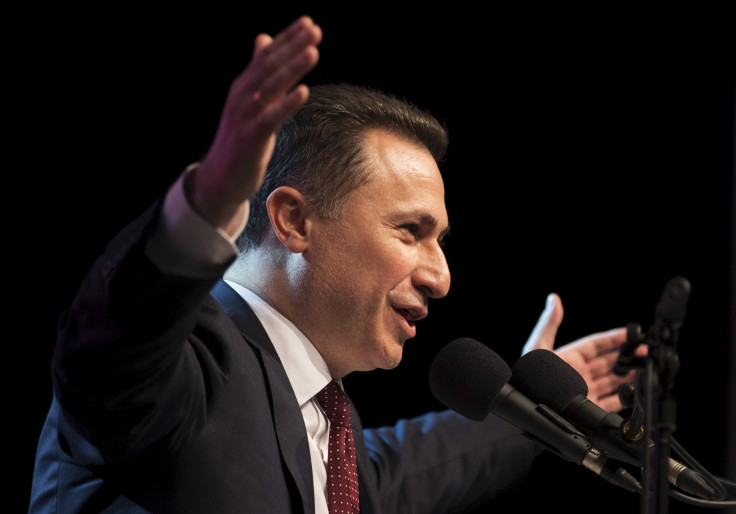Ethnic Albanian Protesters Take To The Streets, Demanding Macedonia PM Gruevski Step Down

Thousands of Macedonians took to the streets of their capital Saturday, demanding the resignation of Prime Minister Nikola Gruevski and allied party leaders. It’s the latest public demonstration in an escalating political crisis that erupted after an opposition leader exposed an alleged massive government phone-tapping operation targeting outspoken opponents of the ruling party.
Agence France-Presse reported the protesters, mostly members of the ethnic Albanian minority, rallied on the streets of Skopje demanding both Gruevski and Ali Ahmeti, the leader of an Albanian political party that’s allied with the prime minister’s conservative allies, step down to make way for elections. In May as many as 40,000 people turned out -- many waving both Albanian and Macedonian flags as an act of solidarity -- demanding Gruevski step down immediately.
Live from Skopje: Albanian movement Besa. Not part of #protestiram, also demand Gruevski’s resignation. #Macedonia pic.twitter.com/mMgxVnfY7O
- Balkanist Magazine (@Balkanist) June 13, 2015The country’s political elite have agreed to hold elections in April 2016, but that soon might not be enough. Opposition socialists have boycotted parliament, alleging electoral fraud in polling last year, and center-leftists are outraged over the allegations Gruevski oversaw the wiretapping of about 20,000 people, including journalists and religious leaders, and committed acts of corruption, including a murder cover-up.
Gruevski has fired back accusing socialist leader Zoran Zaev, who released excerpts in February of what he claims are 670,000 illegally recorded phone conversations, of attempting to destabilize the country. Last month, police clashed with an Albanian armed group in the northern town of Kumanovo, killing 18 people, including five police officers.
Talks in Brussels initiated after the clash ended in gridlock this week. Johannes Hahn, who is in charge of the European Union’s enlargement, lambasted the way negotiations played out.
Macedonia has been a contender to become a member of the European Union and NATO since 2005, but Greece maintains a veto against Macedonia over the country’s name, which it says belongs to a northern Greek region. Macedonia is one of the states formed during the breakup of Yugoslavia, the Soviet-era state that was dissolved in 1992.
© Copyright IBTimes 2025. All rights reserved.






















